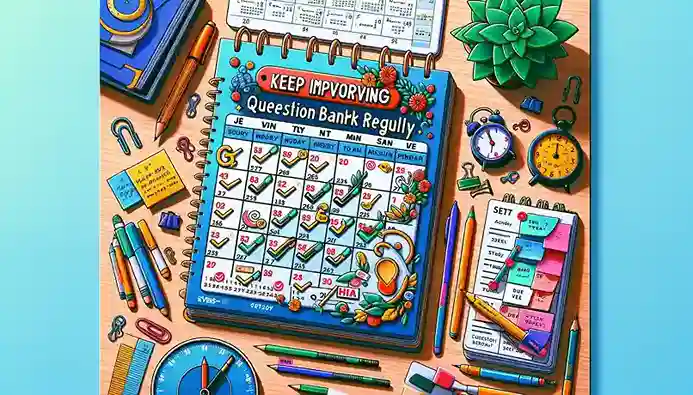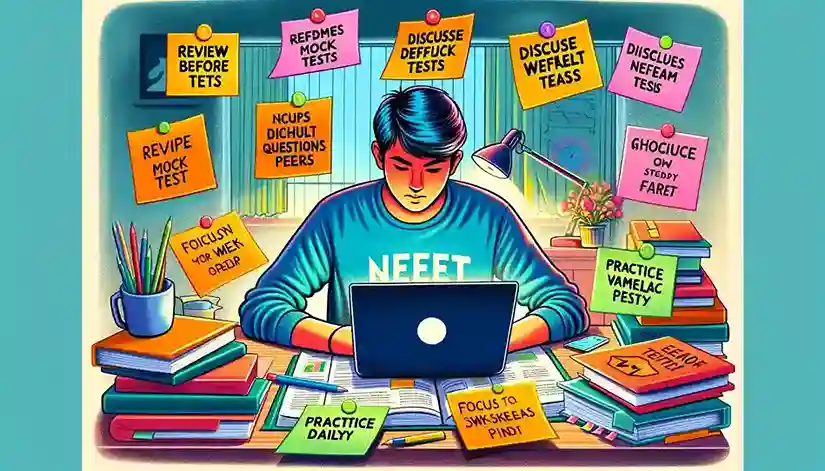How to make your own Question Bank for the NEET exam?
NEET exam stands for National Eligibility Entrance Examination. It is the only national-level medical examination that leads to admission in MBBS, BDS, Ayurveda And Homeopathy courses.
It is a 720-mark examination with 200 questions in total. Out of these 200 questions, only 180 have to be attempted. There are 4 subjects in the examination- Physics, Chemistry, Botany and Zoology.
The exam lasts 3.20 hours. It is conducted in the afternoon from 2 pm to 5.20 pm.
It is an MCQ-based exam which is to be completed in 200 minutes.
It is a time-restricted examination with only 1 minute for each question.
Thus, time management and question practice become of the utmost importance.

How to use the question banks for NEET exam preparation?
First of all, what are question banks?
Nothing, just a collection or set of questions that are:
- The part of books you are practising
- Created by a teacher or mentor you follow
- Your own personalised set of questions
Now, these question banks are to be used for practice. It is advisable to put a time even when you are just practising a simple topic such as plant diversity in biology.
Set a time of 1 hour for 50 questions when you are practising Chemistry or Physics. Keep looking at the clock after every 5 questions to see how your speed is. And later, when you have completed these 50 questions, look at the solutions at the back of the book and check your accuracy. Account for it in a register. This way you can keep understanding if your speed and accuracy are increasing or not.
I know this is a lot of work but you need to do this to improve.
The first step of improvement is always collecting data to check how your graph of improvement is moving. If it is going up you feel satisfied and motivated. If it is going down or stable, you at least know that you need to change your strategy now.

Now, why would you create your “own” Question bank for NEET?
Now, this is an advice I give to all my juniors. Make your specialised question bank. How?
Take a register or your mobile phone. Add your questions to it. If you are using your mobile phone, make 3 different folders- Physics, Chemistry Biology in your picture gallery. Now keep adding questions to these folders.
What types of questions to add to it?
- Questions where you make a mistake in the exam. Keep these questions handy. These have to be practised again twice or thrice.
- Questions where you make a mistake while practising questions from your question banks.
- Questions that you were unable to solve in the first go and had to see the solution behind the book.
- A question that you solved by chance in a mock test, but you did not know how to solve.
- Questions that you find to be very accurate and close to the type of questions that can be asked in the NEET paper.
How will a personalised NEET question bank help?
You have to understand that NEET is entirely based out of NCERT’s now. So, you have a lot of time to practice questions now. You should at least reach a score of 150 in physics and chemistry and 330 before you start increasing the level of your question. If you have done your previous year’s questions very attentively, 140/180 can easily be achieved in physics. In 2023, 35 questions in physics were repeated questions from PYQs.
Keep doing PYQs simultaneously with each chapter. Finish a concept or topic in physics or chemistry, go home, re-practice the questions taught in class or online class and then complete the PYQs. Add imp PYQs to your question bank.
After PYQs have been practised and mastered, choose your desired question banks and start practising with a timer on in at least 8/10 of your practice sessions. When you practice like this, you might make a lot of mistakes. And that is how the brain learns the best- mistakes and the improving on it.
At the end when the exam is close, you will have a question bank that is based entirely on your mistakes and the topics that you find difficult and are required to be recalled again and again.
When the exam is close you need to ensure you are not wasting time, so having a question bank specific to your own needs and shortcomings, is very important and immensely useful.
You need to be very specific in what you will be studying in the last 2 months. So, this will be your own specific question set that will remind and help you to practice the questions and concepts that you struggle with.

So, How will you create your own NEET question bank?
Selecting relevant study material
NCERTs have to be completed at any cost. There is no way around it. NCERTS>>>> Any coaching module or coaching notes. Don’t be under the illusion that if you are studying from a coaching module and not from NCERT, it is better. I would suggest reading NCERT’s again and again and then picking up a coaching module that has questions directly based on NCERT. This is especially important for Biology.
For Chemistry and Physics, your priority should be to first complete the PYQs. Practice them twice or thrice. The first time you practice them should be directly after you study that topic. It will help you understand the concept better and you will be sure that at least your PYQs are done. Then later on keep practicing them every time you revise the chapter.
Only after the PYQs are done, start practicing from your chosen question banks for physics chemistry.
Searching online resources for additional questions
After the question bank is done, and you want to practice more questions, join a lot of telegram channels related to the NEET exam. They have a lot of free resources and question banks that you can use to practice more. Always ensure you have a 1-hour timer on for practising 50 questions.
How to store and organise your question bank for NEET?
You have three options- maintaining a register/book or your mobile or if you have an iPad.
A Register/ Book
Write down each question where you made a mistake. Then, write the steps and explanations which lead to the mistake. Then write the correct answer. Do this after every practice session. At least maintain registering the difficult questions.
However, after every mock test, ensure that you do this practice.
Yes, this can be time-consuming – writing and rewriting questions and answers but remember the benefits it will reap you. When the exam is close by, you can easily
Just skim through these questions and revise quickly.
Creating mobile folders for each topic
You can just take a screenshot of the questions you made a mistake in. Include the difficult questions of your practice sessions. When done with a mock test, write the correct solution in front of the question in the exam paper only and then take a picture and save it. Maintain a seprate folder for each subject and subfolder for each chapter.
Ipad
The process is the same as the mobile, the only advantage you might have is a good Note taking application like Goodnotes. Take a photo of the question and write the solution below the picture in good notes. Create a separate folder for each subject and a notebook for each chapter.

What will you add in your NEET Question bank?
Add both- The wrong answer if you remember it and the correct answer. This way your brain will register your mistake and learn the new solution. Keep coming back to your mistakes and revising them – especially before every mock test.
The first way to improve your scores in mock tests is to at least stop repeating the same mistakes you made in the last mock test. How do you do that? Make your own question bank. The mistakes you make will be very different from the mistakes other people make. This is why a personalised question bank is important.
How to utilize the question bank for study?
The first way to improve your scores in mock tests is to at least stop repeating the same mistakes you made in the last mock test. How do you do that? Make your question bank. The mistakes you make will be very different from the mistakes other people make. This is why a personalised question bank is important.
And, when should you revise your question bank
1 Every 14 days
2 before every mock test.
3. Whenever you practice a similar question while practising
4. When you are bored and don’t wish to study. Scroll through the folder in your gallery
What should the aim of creating your own NEET question bank?
- To increase your score by not repeating mistakes
- Do not repeat any mistakes in any subject
- To increase your score steadily and improve your score
- To maintain a record of your mistakes
- For concept clarity analysis
- To identify areas that need more practice
- Focus time on the areas where You make your unique mistakes because everyone will have different areas of weakness. This will help you avoid practising the general questions for everyone.
- To practice and strengthen your areas of weakness.

Some tips for effective use of question bank
Sharing questions and explanations with peers
If you make a mistake or find a topic to be very difficult, discuss it with your friends. Discussion is one of the best ways to come to a solution. If you have a friend who studies at the same level and pace as you do and is not jealous or bittier, do not let that friend go.
Help each other out. Your aim should be to qualify for NEET together. KEEP each other accountable and keep pushing each other. Discuss difficult topics and solve questions together.
provide feedback and support to each other. If one of you gets demotivated, the other should help. NEET preparation can lead to lifelong friendships.
Seeking guidance from mentors or teachers
Go to your teachers for doubt-solving. If your teacher is very busy, keep all your doubt questions organised in a folder and keep it on your mobile. When you get to talk to your teacher, get help from them and write down all the answers and methods they tell you. Go home and add these answers to your doubt folder.
One most important advice is to increase your speed. Add questions that take more than 3 minutes to solve in your question bank also, and ask your friends and teachers if there is an easier way to do it. If they tell you one, add it to your doubt folder.

Conclusion
I know, this is a lengthy and time-consuming process. You might even get exhausted and irritated. But, this is one of the most important ways you can measure your progress. Slowly, your marks will increase. All you have to do is be patient and keep tracking and maintaining your own question bank. If you do this you will be far ahead of other aspirants.
Everyone can study and remember their syllabi. It is only a very small number of people who take the extra effort to improve on their mistakes. And the only way to improve is to keep tracking your mistakes. Now, how do you do that? By creating a question bank of your own mistakes and questions that you find to be challenging.





